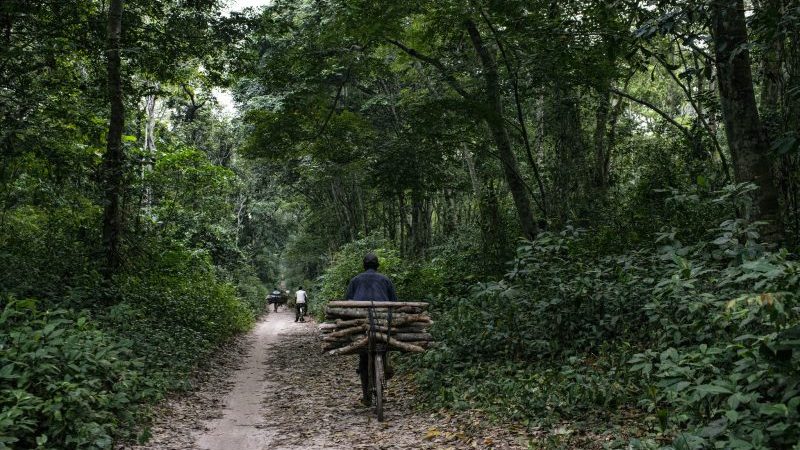A major forest protection scheme in the Democratic Republic of Congo is in turmoil, amid a standoff between the country’s environment ministry and international donors.
Environment minister Amy Ambatobe has awarded three forestry concessions to Chinese companies and started a process to allocate 14 more. This would open an area of rainforest the size of Belgium to industrial logging, with a major impact on the climate.
The Central Africa Forest Initiative (Cafi), which gets the bulk of its funding from Norway, responded in March by freezing payments to DRC projects. It says the concessions breach an agreement it struck with the DRC government to conserve the forest in return for international aid money. A wider group of donors including US and Japan wrote to Cafi’s national funding channel Fonaredd, expressing concerns.
But a meeting note shared with Climate Home News shows Ambatobe refused to back down to international criticism last month, his top official walking out of Fonaredd’s technical committee. Ambatobe did not respond to an emailed request for comment.
If you like what we do, support us
Become a CHN member for as little as $5 per month to help us keep bringing you the most in-depth coverage of climate politics and underreported stories from around the world.
We have set up a Patreon account. It’s a simple, safe and easy way for you to become part of a community that will secure and guide our future.
Thank you!
It is not the first time DRC politicians and donors have had conflicting priorities. The latest stalemate reflects a deepening political crisis in DRC, coupled with dwindling patience in Norway for a vast climate finance programme with patchy results.
Last week Norway’s Office of the Auditor General issued a highly critical report on its international forest protection programme, including Cafi’s precursor in DRC. Norway has spent almost a billion kroner ($120m) in DRC over the past decade, but deforestation continued to rise.
The money was spent with inadequate controls to prevent fraud, report reliable results and protect human rights, auditors said.
“I think this is throwing money right out of the window,” Christian Nellemann, director of the Norwegian Center for Global Analysis, told broadcaster NRK.
“It is difficult to achieve results,” admitted Norway’s climate minister Ola Elvestuen. “But it is still right for Norway to contribute forest projects in the country. To withdraw will not lead to less deforestation. On the contrary, it will get worse.”
DRC elections originally scheduled for November 2016 have been deferred by two years. A well-placed source in Kinshasa, speaking on condition of anonymity, suggested Ambatobe saw logging contracts as a bigger vote-winner than foreign aid for forest protection. “We are dealing with a fragile state, where governance issues are problematic,” they said.
A blurry photograph seen by CHN of a document thought to be a contract for a logging concession asked the company to deposit $50,000 in an account with scandal-hit BGFIBank. Campaigners have asked for records of what happened to that money, to no avail.
The climate implications are substantial. Not only does the Congo basin hold the world’s second largest rainforest, scientists recently discovered vast stores of carbon-rich peat under the trees. If disturbed, it could be a big source of greenhouse gas emissions.
Report: Norway, France urged to block DR Congo forestry project
Sources close to the matter said Cafi is trying to bypass the “rogue” environment minister in DRC.
From the outset, Cafi has channeled funds through international bodies, including the World Bank and UN Development Programme, rather than trust the corruption-prone government.
Many initiatives do not rely on Ambatobe’s cooperation. Measures ranging from family planning to sustainable farming techniques aim to ease the strain of a soaring population on forest land.
When it comes to the timber trade, though, there is a stalemate. A proposal to crack down on illegal logging and formalise the industry is among those in limbo, Cafi lead official Berta Pesti told CHN by email: “As you can see, this is a very tricky situation: the very programme that could contribute to reinforcing forest governance is suspended.”
In principle, Cafi supports the aspiration of the DRC government to eventually lift a moratorium on new logging concessions, in place since 2002, on the basis a regulated industry could support sustainable development. However, the deal comes with certain conditions that, Cafi says, have yet to be met.
Ambatobe’s ministry has argued the recently awarded concessions do not breach the moratorium because the areas had been previously exploited.
“There is a difference in interpretations,” said DRC lead climate negotiator Tosi Mpanu Mpanu. “We should continue to try and look at ways to bring convergence, because the stakes are so high and so much could be lost.”
The international forest aid programme, known as Redd+, is running into problems even in comparatively developed and stable countries like Indonesia and Brazil, he noted. DRC is one of the poorest nations in the world and recovering from conflict. “You need to take that into account,” Mpanu Mpanu said. “It is not easy for our political masters here to understand that Redd+ takes time.”
Jo Blackman, campaigner with Global Witness, urged Cafi to halt activities until DRC had had free and fair elections. “We see this approach of freezing and unfreezing funds is failing, because it is not addressing the fundamental problem of weak governance in the DRC forest sector, which is essentially political,” she told CHN.
International NGOs see a glimmer of hope for DRC’s forests in laws that allow for community ownership. “This is an important development,” said Simon Counsell of Rainforest UK, with some 75 million hectares available for communities to manage themselves. “There are numerous pitfalls,” he warned, stressing the importance of full consultation and respect for communities’ rights.
